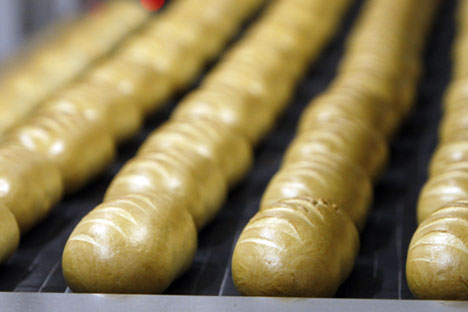
In a 7-hour shift Avtom-2's pilot bakery can produce about 700 loafs of bread.
Ria Novosti/Vadim ZhernovThe new dough production technology created by the company, Avtom-2, is based on the mechanical loosening of dough, and facilitates the baking of whole wheat bread without yeast and additives. Traditionally, the mass production of bread, apart from flour and water, involves the use of antioxidants, preservatives and other chemical compounds. With this new technology the time needed for bread production can be reduced by 120-fold. To achieve this result, the Russian inventors added a dough mixer to the usual production process.
"This is a much-needed technology for the mass production of healthy natural breads,” said Ekaterina Kozyr, an expert on patents and copyrights in Russia. "The inventors are genuine pioneers in their field, and the company has patented this unique technology not only in Russia, but also in the European Union, in China, Canada, and the USA.''
In a 7-hour shift Avtom-2's pilot bakery can produce about 700 loafs of bread. “On account of the substitution of the chemical rising of dough with natural mixing, the bread can be preserved for quite a long time, and after five days it will still be soft,” said Evgeny Perevozchikov, the director of Avtom-2.
In the past few years scientists have published the results of innumerable studies that confirm how yeast culture has a negative effect on the human body. Alexander Boldyrev, a PhD in Biology, has demonstrated that the processes of yeast fermentation weakens immunity and can contribute to cancer.
According to Andrey Averyanov, a representative at the Petrovsky food market's laboratory, about 80 percent of the world’s adult population and 95 percent of children suffer from the side effects of yeast use.
“The mass production of bread entails the use of genetically modified yeast, which means that fermentation and rotting take place in the body,'' explained Mr. Averyanov. "Microbial flora and traumas of the linings of the gastrointestinal tract become more common. Dangerous micro-organisms can easily leak into the bloodstream. Constipation, varicose veins, trophic ulcers, and gallstones are examples of the side effects of yeast consumption. As a result, the pathological changes in vital organs transform a person into a plantation for the cultivation of viruses, parasites and bacteria.”
According to the Avtom-2 inventors, another problem is the flour used for the mass production of bread. To obtain high-quality white flour, wheat is winnowed of its best parts, the hull and the sprout. Left over is its dead part, made up mainly of starch. As a result, the starch settles in the body in the form of mucus that clogs the intestinal walls.
To bake their bread Avtom-2 inventors instead use raw flour from whole wheat, including the healthy and biologically active parts of the plant -- the hull and the sprout. In addition, they have worked out a system to avoid the use of yeast in bread production. “In this mixture there is much less gluten than in the refined flour of the finest sorts,” said Mr. Averyanov.
If until recently yeast-free bread was primarily prepared by small bakeries, the new Russian technology can be used in mass bread production.
“On the European market, the share of small bakeries does not exceed 15% of the entire bread market, and thus prices are quite high,'' said Mr. Averyanov. "The new technology will allow producers to avoid using yeast dough, and to produce healthy natural bread at a reasonable price.”
According to the Avtom-2 inventors, their technology has attracted the attention of producers from Israel, Turkey and the Netherlands. The quality of bread has also attracted the Russian military, which signed a contract with Avtom-2.
All rights reserved by Rossiyskaya Gazeta.
Subscribe
to our newsletter!
Get the week's best stories straight to your inbox